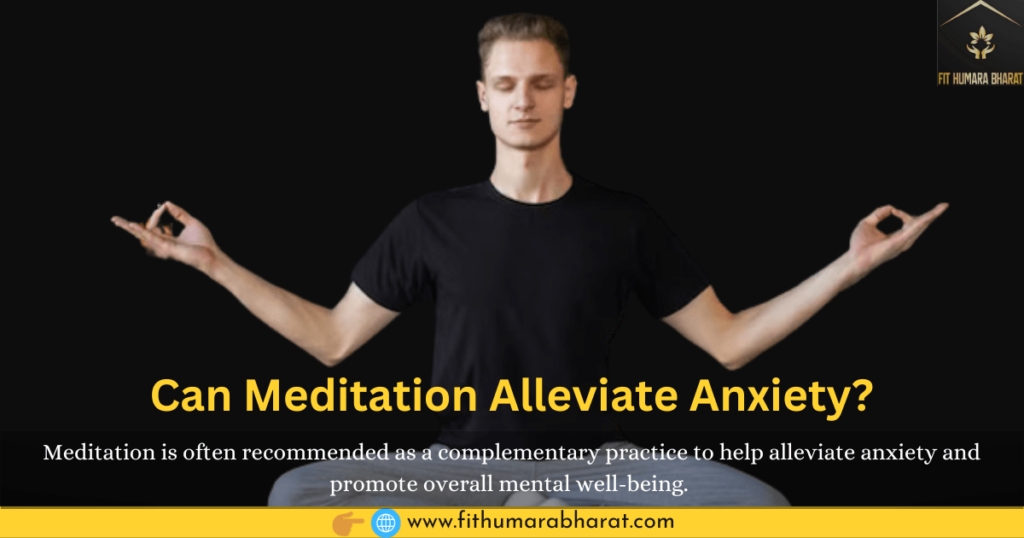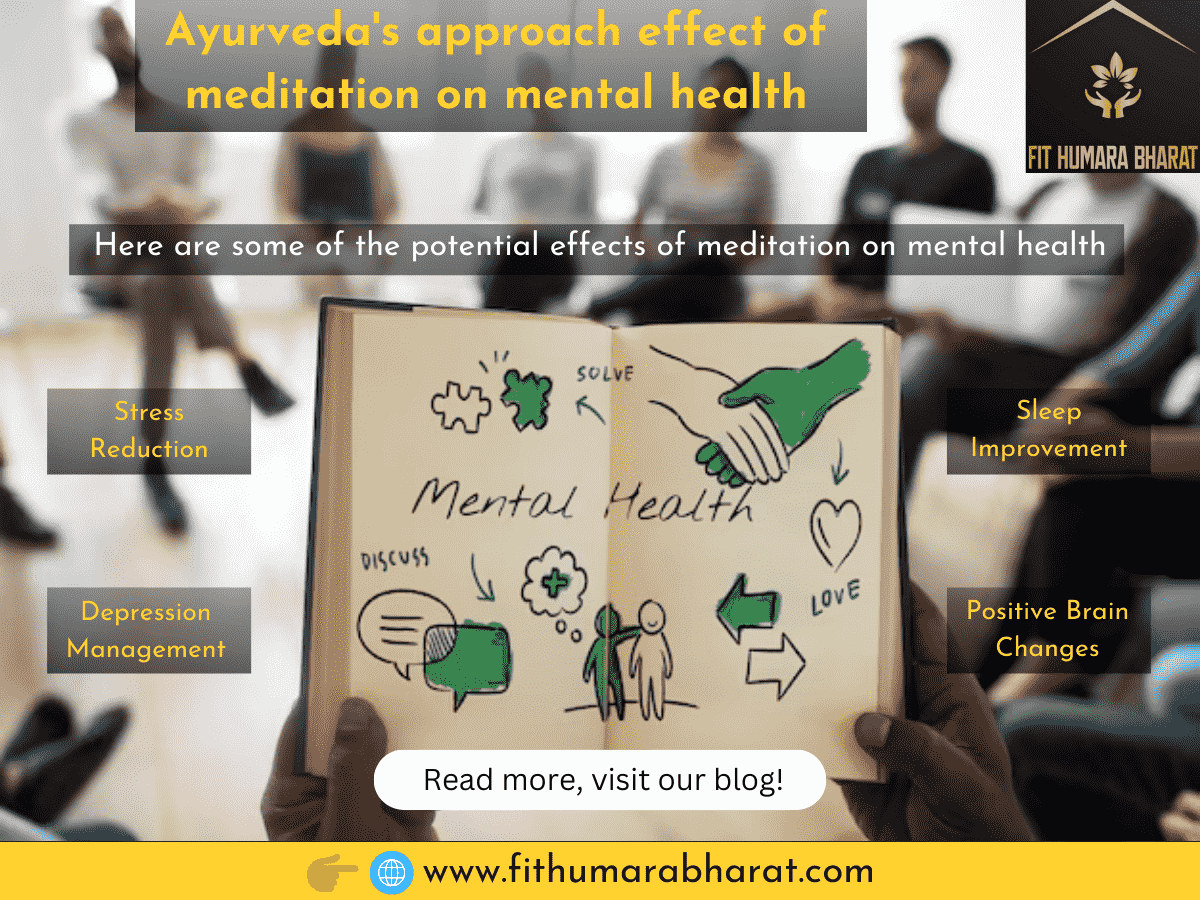In our fast-paced and often stress-filled modern world, anxiety has emerged as a prevalent and pressing concern for many individuals. It can manifest in various forms, ranging from generalized anxiety disorder to specific phobias, and it frequently exerts a significant impact on both mental and physical well-being. While traditional treatments such as therapy and medication can prove effective, an increasing number of people are exploring holistic alternatives like meditation, Ayurveda, and naturopathy as means to manage and reduce their anxiety levels.

Comprehending Anxiety
Before we delve into the roles of meditation, Ayurveda, and naturopathy in anxiety management, it’s essential to establish a clear understanding of anxiety itself and its effects on individuals.
Anxiety represents a natural and adaptive response to stress or perceived threats. It can sharpen our alertness and focus in challenging situations. However, when anxiety transforms into a chronic or excessive state, it can inflict adverse effects on both mental and physical health. Common anxiety symptoms encompass:
- An excess of worry or fear regarding future events.
- A sense of restlessness and difficulty relaxing.
- Elevated heart rate and shallow breathing.
- Muscular tension and trembling.
- Impaired concentration.
- Sleep disturbances.
- Gastrointestinal discomfort, such as stomachaches and nausea.
Chronic anxiety can escalate into more severe conditions, including panic disorder, social anxiety disorder, or generalized anxiety disorder. Additionally, it can contribute to other health issues such as cardiovascular problems and weakened immune function.
Meditation and Its Role in Managing Anxiety
Meditation, a practice that unites the mind and body, has been utilized for centuries to promote relaxation, self-awareness, and mental clarity. Many individuals embrace meditation as a tool to cope with anxiety due to its soothing and stress-reducing effects. However, can meditation genuinely serve as a remedy for anxiety?
While meditation may not eradicate anxiety entirely, it certainly holds a pivotal place within the toolkit for managing anxiety. Here is how meditation can provide assistance:
1. Stress Mitigation:
Stress stands as a primary contributor to anxiety. Meditation is renowned for its capacity to diminish stress by facilitating relaxation and curtailing the production of stress hormones like cortisol. Regular meditation practice can enhance an individual’s resilience to stressors and lower overall anxiety levels.
2. Mindfulness:
Mindfulness meditation encourages individuals to concentrate on the present moment devoid of judgment. This practice fosters heightened awareness of anxious thoughts and sensations, allowing individuals to observe them without succumbing to overwhelming emotions. Over time, mindfulness can lead to improved emotional regulation and reduced anxiety.
3. Triggering the Relaxation Response:
Meditation activates the body’s relaxation response, which counters the fight-or-flight reaction associated with anxiety. This response encompasses lowered blood pressure, decelerated heart rate, and relaxed muscles, all of which contribute to alleviating anxiety symptoms.
4. Enhanced Sleep:
Anxiety often gives rise to sleep disturbances, which can exacerbate the condition. Meditation promotes improved sleep quality by calming the mind and quieting racing thoughts, facilitating an easier path to falling asleep and maintaining sleep.
Ayurveda’s Approach to Anxiety Management
Ayurveda, an ancient system of medicine originating in India, centers on harmonizing the body, mind, and spirit to promote holistic well-being. Ayurveda acknowledges that anxiety may arise from imbalances within the body and mind, offering diverse approaches to manage and reduce anxiety:
| 1. | Dosha Balance | Ayurveda frequently links anxiety to imbalances in the doshas, which are the three fundamental energies governing the body. Identifying one’s dominant dosha (Vata, Pitta, or Kapha) and integrating lifestyle and dietary alterations to balance it can contribute to anxiety alleviation. |
| 2. | Diet and Nutrition | Ayurveda underscores the significance of a balanced diet tailored to an individual’s dosha and their current imbalances (Vikriti). Specific foods and herbs are recommended to pacify the nervous system and diminish anxiety. For instance, herbal remedies such as ashwagandha and brahmi are esteemed for their anxiety-reducing qualities. |
| 3. | Yoga and Pranayama | Ayurveda and yoga share a deep-rooted connection, with numerous Ayurvedic practices encompassing yoga postures (asanas) and breathing techniques (pranayama). Consistent practice can tranquillize the mind, diminish stress, and alleviate anxiety symptoms. |
| 4. | Ayurvedic Herbs | Ayurveda draws upon an extensive array of herbs and formulations to address anxiety. Besides ashwagandha and brahmi, herbs like shankhpushpi and jatamansi are frequently employed to reduce anxiety and stimulate mental clarity. |
Naturopathy’s Role in Anxiety Management
Naturopathy is a holistic approach to healthcare that prioritizes addressing the root causes of health issues instead of merely treating symptoms. Naturopathic therapies can effectively manage anxiety by tending to both physical and emotional imbalances:
| 1. | Nutritional Counseling | Naturopathic practitioners assess an individual’s nutritional status and may recommend dietary alterations and supplements to bolster brain health and diminish anxiety. |
| 2. | Herbal Medicine | Herbal remedies such as valerian, passionflower, and lavender possess calming effects on the nervous system, aiding in the alleviation of anxiety symptoms. |
| 3. | Lifestyle Modifications | Naturopathy underscores lifestyle shifts to diminish anxiety, including routine exercise, stress management techniques such as meditation and yoga, and securing adequate sleep. |
| 4. | Hydrotherapy | Hydrotherapy, encompassing the use of water in various forms like baths and compresses, can foster relaxation and reduce anxiety. |
| 5. | Mind-Body Techniques | Naturopathic doctors may advocate mind-body techniques such as biofeedback, relaxation exercises, and visualization to manage anxiety. |
| 6. | Identifying Food Sensitivities | In some cases, individuals may experience anxiety as a result of food sensitivities or allergies. Naturopathic doctors can identify and address these triggers. |
Choose a Perfect Anxiety Management
In the quest for anxiety management and reduction, individuals are increasingly drawn to holistic methods such as meditation, Ayurveda, and naturopathy. These practices, while not entirely eliminating anxiety, certainly play an essential role in the anxiety management toolkit. Meditation bestows relaxation, mindfulness, and stress reduction. Ayurveda imparts insights into dosha imbalances and offers dietary and lifestyle adjustments for anxiety alleviation. Naturopathy takes a holistic approach, attending to both the physical and emotional facets of anxiety.
It is crucial to note that the effectiveness of these approaches may vary from person to person. Some individuals may find relief through a combination of these practices, while others may derive greater benefits from a specific approach. As with any health concern, it is advisable to consult qualified healthcare professionals who specialize in these holistic modalities. Collaboratively, they can formulate a personalized anxiety management plan tailored to your distinct needs and preferences. Ultimately, the journey toward reduced anxiety is profoundly individual, and these holistic approaches provide valuable pathways toward achieving a calmer, more balanced state of mind and overall well-being.
Thank You
- Meditation and Yoga can Modulate Brain Mechanisms that affect Behavior and Anxiety-A Modern Scientific Perspective
- The Effect of Mindfulness-Based Therapy on Anxiety and Depression: A Meta-Analytic Review
- Meditative Therapies for Reducing Anxiety: A Systematic Review and Meta-analysis of Randomized Controlled Trials*
- Randomized Controlled Trial of Mindfulness Meditation for Generalized Anxiety Disorder: Effects on Anxiety and Stress Reactivity
- Mindfulness and Symptoms of Depression and Anxiety in the General Population: The Mediating Roles of Worry, Rumination, Reappraisal and Suppression




 Sources
Sources